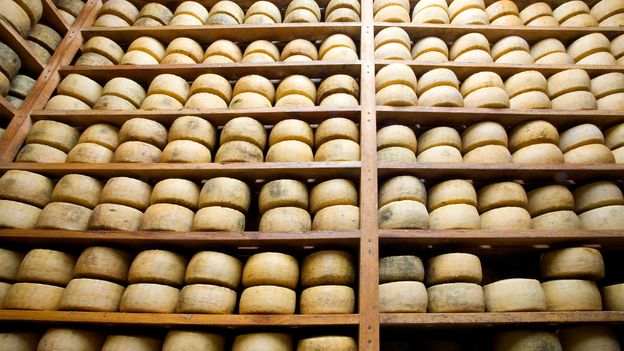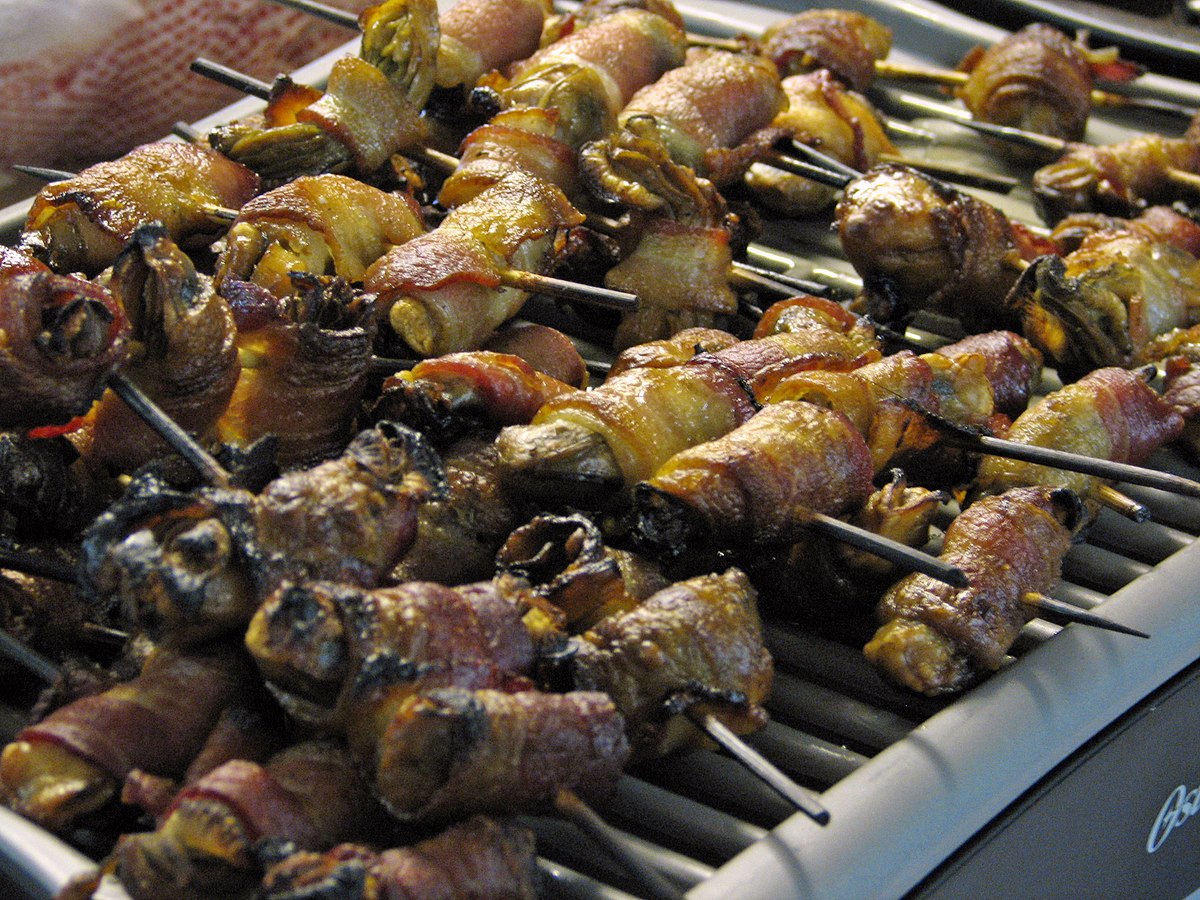Thank you, m. vinteuil, This link really was all you wanted to know about pecorino. Pleased to see the adjective 'sharp' is used to describe it.
The Cheese Board
Collapse
Announcement
Collapse
No announcement yet.
X
-
Interesting, yes. It looks as if they might have used it in the context if they had omitted 'towards', though the OED says:Originally posted by vinteuil View Post.
... " the pecorino industry careened towards life support". Pedants will prefer careered to careened here, I think.
.
"[Influenced by career v.2] To rush headlong, to hurtle, esp. with an unsteady motion. Chiefly U.S." But I think we probably prefer the King's English. Even though 'to careen' means to heel over, of a ship, that isn't exactly appropriate here.
Anyway, It's good to see that pecorino is held in high esteem.
On 'entre la poire et le fromage', I imagined the pudding came last and you followed the good red wine with something sweet to finish.It isn't given us to know those rare moments when people are wide open and the lightest touch can wither or heal. A moment too late and we can never reach them any more in this world.
Comment
-
... we've been here before -Originally posted by french frank View Post'entre la poire et le fromage', I imagined the pudding came last and you followed the good red wine with something sweet to finish.
Originally posted by french frank View PostSo I've probably given my explanation for the French custom (correct!) to have the cheese course after the main course and not after the pudding as many in Angleterre would have it. If push comes to shove the same good red wine can be served for a main course and the cheese, but for the pudding a sweet dessert wine is required. Impossible to alternate red, dessert, red again. I'm not sure that a pudding wine is much of a thing in the UK. Or even wine-drinking judging by my observations in restaurants (which cannot here be described ).
).
Originally posted by vinteuil View Post
... well, there are other ways to finish a meal. At traditional English dinners you might have after the main courses - pudding, followed by cheese, followed by a savoury (devils on horseback, scotch woodcock &c), followed by port & nuts, followed by coffee & digestifs. I have been at university meals and elsewhere which followed that pattern.
At the British Embassy in Paris the diplomatic niceties were solved by having the cheese and puddings brought to the table at the same time, leaving the guests to decide whether they wanted to follow British or French customs
.
Comment
-
Originally posted by french frank View Post
Interesting, yes. It looks as if they might have used it in the context if they had omitted 'towards', though the OED says:
"[Influenced by career v.2] To rush headlong, to hurtle, esp. with an unsteady motion. Chiefly U.S." But I think we probably prefer the King's English. Even though 'to careen' means to heel over, of a ship...
I guess one might careen towards capsizing.
Comment
-
That stuff from those tubes was, to use that great French word, "dégueulasse", which seems fitting to describe what to me always smelt of - let's not mince words here - sick. Aged Parmesan (of at least 24 months vintage) or (my favourite) Parmigiano Rosso, made from the milk of, surprise, surprise, "red cows" is a truly great cheese, alas with a price tag increasingly to match these days. But, broken into bite-size pieces, it makes for a great accompaniment to something like fino - or maybe amontillado sherry. The cheese acts as a fine counterpoint to the slight sweetness of the wine. Plus, the other great use to which one can put parmesan rinds (fresh or frozen) is to add one (or two) of them to meat ragù or, indeed, any kind of stew/casserole or thick bean soup.Originally posted by Pulcinella View PostI'm sadly not a fan of Parmesan (horrid experience in a staff canteen ages ago!) but, being a Lancashire lad, I've found that this from Aldi behaves very similarly in dishes I use it for.
I can cope with parmesan shavings; it's the texture and smell of the grated stuff as it melts as a topping or is used in sauces that I can't stand. Those disgusting Kraft tubes! Aargh!Last edited by HighlandDougie; 25-11-23, 19:19.
Comment
-
How do you do that? You're always doin' it!Originally posted by vinteuil View Post
... we've been here before -

It isn't given us to know those rare moments when people are wide open and the lightest touch can wither or heal. A moment too late and we can never reach them any more in this world.
Comment
-
Yes, I think the element of side to side motion, whether US or UK usage, means it wasn't perhaps the best choice. The whole article did read a bit as if it had been written by someone from across the pond which would make sense if it is this John Henderson https://johnhendersontravel.com/about-john-henderson/ who is in Italy but originally from USA, rather than the BBC journalist of the same name.Originally posted by french frank View Post
Interesting, yes. It looks as if they might have used it in the context if they had omitted 'towards', though the OED says:
"[Influenced by career v.2] To rush headlong, to hurtle, esp. with an unsteady motion. Chiefly U.S." But I think we probably prefer the King's English. Even though 'to careen' means to heel over, of a ship, that isn't exactly appropriate here.
Anyway, It's good to see that pecorino is held in high esteem.
On 'entre la poire et le fromage', I imagined the pudding came last and you followed the good red wine with something sweet to finish.
I was intrigued by thiswhich seems a culinary impossibility, so I think "served on" was perhaps omitted? Reading up about deep-fried artichokes was another "well I didn't know that" bit of learning. https://memoriediangelina.com/2023/0...i-alla-giudia/The artichoke is deep fried on a bed of thick pecorino sauce
Comment
-
That was the staff canteen reaction.Originally posted by HighlandDougie View Post
That stuff from those tubes was, to use that great French word, "dégueulasse", which seems fitting to describe what to me always smelt of - let's not mince words here - sick. Aged Parmesan (of at least 24 months vintage) or (my favourite) Parmigiano Rosso, made from the milk of, surprise, surprise, "red cows" is a truly great cheese, alas with a price tag increasingly to match these days. But, broken into bite-size pieces, it makes for a great accompaniment to something like fino - or maybe amontillado sherry. The cheese acts as a fine counterpoint to the slight sweetness of the wine. Plus, the other great use to which one can put parmesan rinds (fresh or frozen) is to add one (or two) of them to meat ragù or, indeed, any kind of stew/casserole or thick bean soup.
We were given two helpings of dessert in compensation, but the (in my case permanent) damage had been done.
Comment
-
Today's delight from the deli was Fourme d'Ambert, a blue cheese from the Auvergne (why is it the Auvergne, I wonder?). This is said to be one of the oldest French cheeses, allegedly dating back to Roman times; it's called semi-hard, but I would have called it semi soft. It's softer, gentler than many blues, without the distinctive tangy sharpness. I found it went admirably with the hawthorn jelly, but when the stronger Spanish cabrales arrived I switched over to, now what's it called? Those long, whitish stems ... sillery? cullery? (I like to spare feelings when I can!). Anyway, that went better than the sweeter jelly. Gherkins and olives go well with the stronger cheeses, but not the jelly.
(I like to spare feelings when I can!). Anyway, that went better than the sweeter jelly. Gherkins and olives go well with the stronger cheeses, but not the jelly.
Interesting etymological point: the word fourme has the same root as fromage and formaggio, referring to the 'shape' or form of the cylindrical moulds. And fourme is actually closer to the Italian word than the French.It isn't given us to know those rare moments when people are wide open and the lightest touch can wither or heal. A moment too late and we can never reach them any more in this world.
Comment
-
... why not 'the' Auvergne? On recent holidays I have stayed in the Ardennes, the Bourbonnais, the Jura, the Ardeche, the Midi, the Cote d'Azur, the Vaucluse, the Luberon...Originally posted by french frank View PostFourme d'Ambert, a blue cheese from the Auvergne (why is it the Auvergne, I wonder?)
But why not *the Provence???
.
Comment
-
I cannot answer that question. I did look it up to check whether Auvergne was like 'the Ukraine', which we don't say any more. But it seems that it's used currently with and without the the, which probably means people are as uncertain as I was.Originally posted by vinteuil View PostBut why not *the Provence???
It isn't given us to know those rare moments when people are wide open and the lightest touch can wither or heal. A moment too late and we can never reach them any more in this world.
Comment




Comment